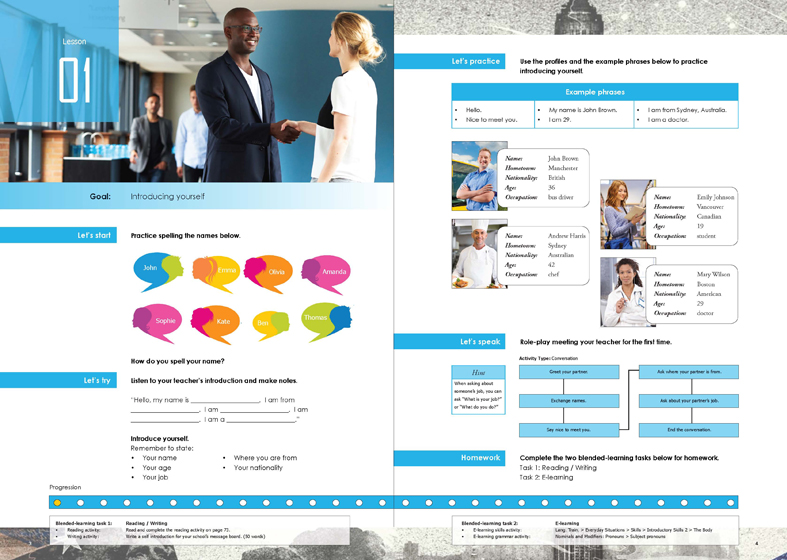
Manuals > General English > Rosetta Stone Advantage > Beginner - Book 1 > Lesson 1
< Previous Lesson | Next Lesson >

By the end of the lesson, the student should be able to greet someone and introduce themselves
Communication strategies:
The student should be able to able to greet someone and introduce themselves by following the 4 steps below:
1) greet your partner
2) state your name
3) state where you are from
4) state your occupation
e.g. Hi, nice to meet you. My name is Hannah Green. I am from Wellington in New Zealand. I am a teacher.
Words and rules:
The student should be able to use the present simple tense to introduce themselves.
The student should be able to use "I am" and "my".
The student should be able to use some basic greetings.
Appropriateness:
Non-verbal behaviour: The student should know how to do a correct handshake.
Register: When meeting a new person outside business situations a casual register is used.
Social rules: We usually don't say our age or ask for someone's age when introducing ourselves.
Cultural references: "Where are you from?" can be pronounced "Where ya from?"
NA
Because the lesson touches on the topic of nationalities, you are welcome to introduce some of the following vocabulary if you like.
1) Australian (n)
2) American (n)
3) Canadian (n)
4) Indian (n)
5) Indonesian (n)
6) Spanish (n)
7) French (n)
8) Chinese (n)
9) Korean (n)
10) Brazilian (n)
Option 1:
Difficulty ★
Type:
Matching game
Purpose:
Introduction of nationalities
Method:
Partner 1 says a country, partner 2 then says the related adjective.
1) Japan.
2) Japanese.
Option 2:
Difficulty ★★
Type:
Presentation
Purpose:
Uncontrolled practice of lesson goal.
Method:
P1 imagines they are a famous person and introduces themselves.
Option 3:
Difficulty ★★★
Purpose:
To teach the student how to end a conversation.
Type:
Vocabulary introduction
Method:
Teach the student some expressions they can use to end a conversation.
e.g. It was nice to meet you. Bye.
It’s been nice talking to you, but I have to go.
I really enjoyed talking to you, but I need to go.
“Naruhodo” Point
We say “an” before words that start with vowel sounds. (It’s based on pronunciation, not spelling) compare “a university” / “an SUV”
Extra questions you might like to ask in the lesson
- Where are you from?
- What’s your name?
- What do you do?
- How old are you?
- What’s your nationality?
A speaking hint you might like to use
AAA = Answer Add Ask
> Feel free to use this speaking hint in the “Let’s Practice” / “Let’s Speak” sections of the lesson. This is particularly useful when describing someone’s personality.
Question: Where are you from?
Answer: I’m from Sydney.
Add: But I live in Tokyo now.
Ask: How about you? Where are you from?
Let’s start
Practice spelling the names below.
e.g. John J-O-H-N
A) How do you spell your name?
B) My name is Ben.
A) How do you spell that?
B) B-E-N
Let’s try
Listen to your teacher’s introduction and make notes.
“Hello, my name is Peter. I am from Chicago. I am American. I am 25. I am a doctor.”
Introduce yourself.
My name is Ben. I am 27. I am a teacher. I am from Australia. I am Australian.
Let’s practice
Use the profiles and the example phrases below to practice introducing yourself.
Name: John Brown
Hometown: Manchester
Nationality: British
Age: 36
Occupation: bus driver
e.g. My name is John Brown. I am from Manchester. I am British. I am 36. I am a bus driver.
Let’s speak
Role-play meeting your teacher for the first time.
A) Hello.
B) Hi
A) I’m Ben.
B) I’m Jasmine.
A) Nice to meet you.
B) Nice to meet you too.
A) Where are you from?
B) I’m from the US.
A) What do you do?
B) I’m a teacher.
A) Cool.